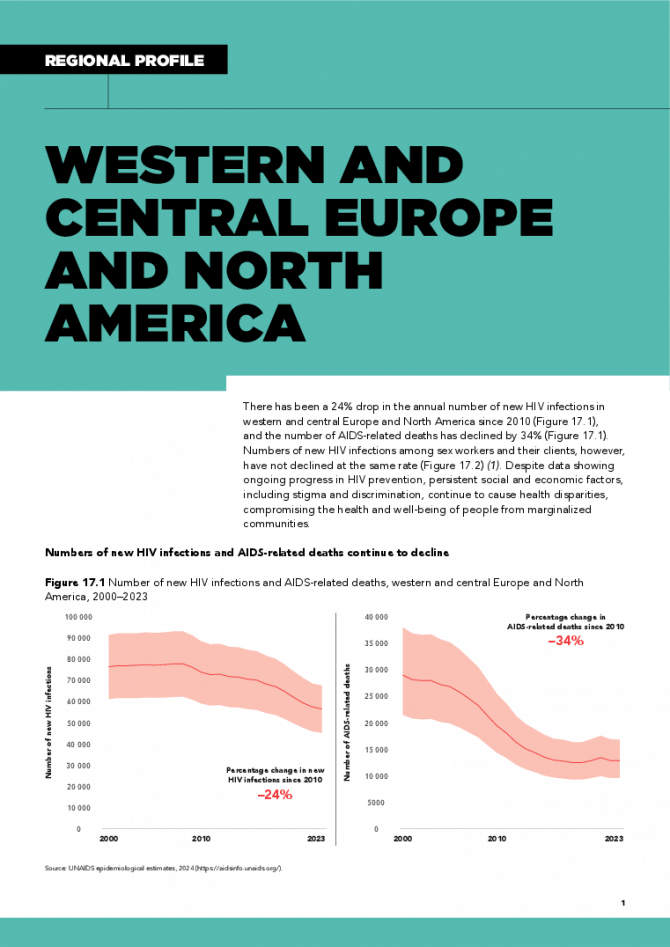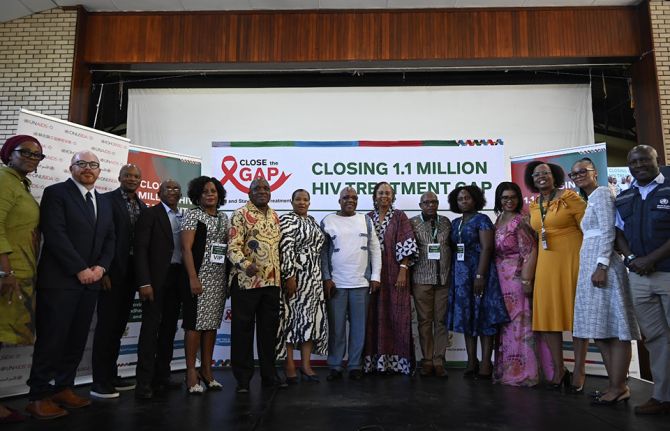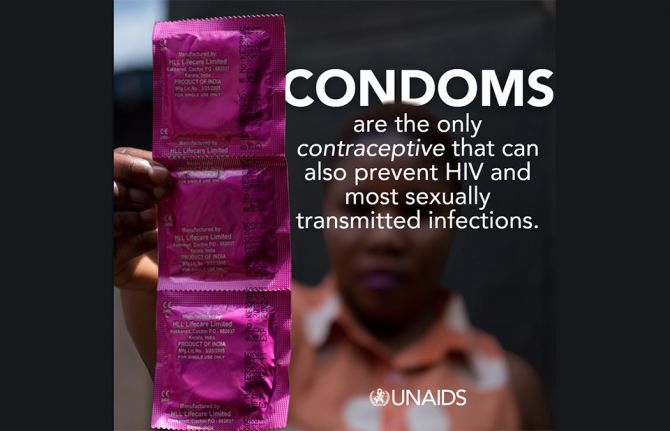Western Central Europe

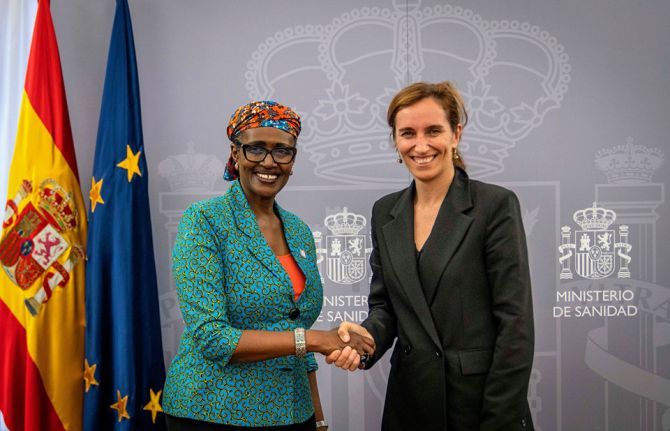
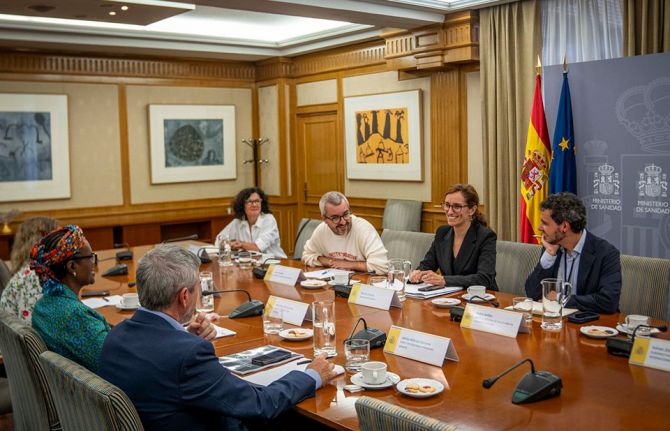
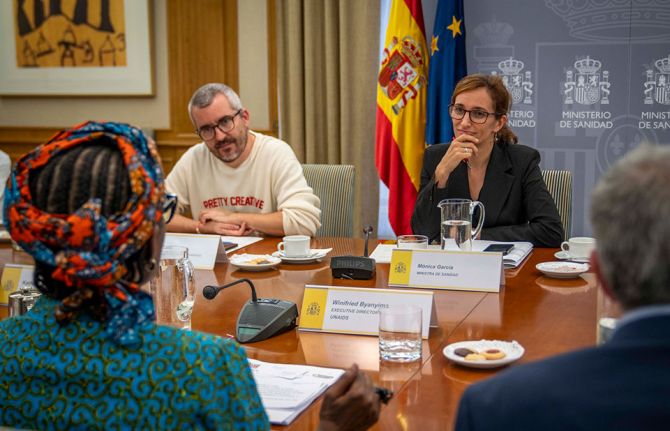
Press Release
UNAIDS welcomes the Spanish government’s announcement of a new € 1 million contribution to overcome the global AIDS pandemic
15 October 2024 15 October 2024GENEVA, 15 October 2024—The Spanish government has today announced a further € 1 million contribution to UNAIDS to support its work to end AIDS by 2030 as part of Sustainable Development Goals. The announcement was made following a meeting between Spain’s Minister of Health Mónica García Gómez and the Executive Director of UNAIDS Winnie Byanyima in the country’s capital Madrid.
“We warmly welcome Spain’s commitment to ending AIDS,” said Ms Byanyima. “We are at a critical moment in the response to HIV, and the path global leaders take this year will determine whether the pandemic continues indefinitely or we end AIDS by 2030. Spain’s solidarity with UNAIDS and the global AIDS response, and its commitment to tackling stigma and discrimination, is testament to their determination to get the world on track to end AIDS and save millions of lives. Spain has set an example for the rest of the world.”
Spain is a long-standing champion of the right to health. During the Spanish Presidency of the Council of the European Union in the second half of 2023, Spain made the fight against stigma and discrimination associated with HIV a political priority. Spain also joined the Global Partnership for Action to Eliminate all forms of HIV-related Sigma and Discrimination and is moving forward with its implementation plan to eliminate stigma in health, workplace and education settings.
UNAIDS looks forward to continuing to strengthen its partnership with Spain to advance progress towards global targets, and to build a robust and rights-based response to end AIDS by 2030 and sustain the gains into the future.
UNAIDS
The Joint United Nations Programme on HIV/AIDS (UNAIDS) leads and inspires the world to achieve its shared vision of zero new HIV infections, zero discrimination and zero AIDS-related deaths. UNAIDS unites the efforts of 11 UN organizations—UNHCR, UNICEF, WFP, UNDP, UNFPA, UNODC, UN Women, ILO, UNESCO, WHO and the World Bank—and works closely with global and national partners towards ending the AIDS epidemic by 2030 as part of the Sustainable Development Goals. Learn more at unaids.org and connect with us on Facebook, Twitter, Instagram and YouTube.
Region/country
Documents
Western and Central Europe and North America regional profile — 2024 global AIDS update The Urgency of Now: AIDS at a Crossroads
22 July 2024
There has been a 24% drop in the annual number of new HIV infections in western and central Europe and North America since 2010, and the number of AIDS-related deaths has declined by 34%. Numbers of new HIV infections among sex workers and their clients, however, have not declined at the same rate. Despite data showing ongoing progress in HIV prevention, persistent social and economic factors, including stigma and discrimination, continue to cause health disparities, compromising the health and well-being of people from marginalized communities. Related links: New UNAIDS report shows AIDS pandemic can be ended by 2030, but only if leaders boost resources and protect human rights now | Full report
Related
 U=U can help end HIV stigma and discrimination. Here’s how
U=U can help end HIV stigma and discrimination. Here’s how

27 February 2025
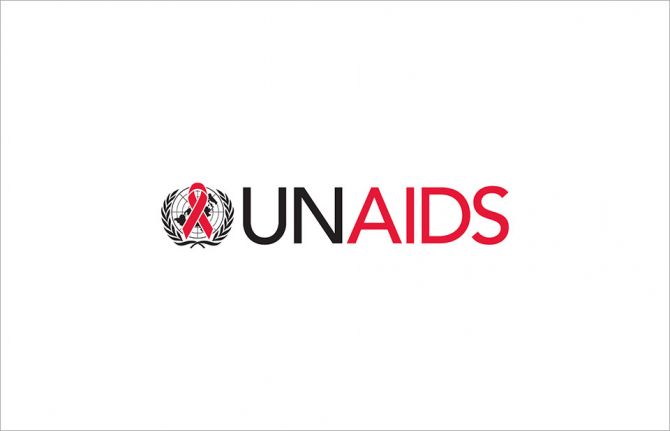 UNAIDS urges that all essential HIV services must continue while U.S. pauses its funding for foreign aid
UNAIDS urges that all essential HIV services must continue while U.S. pauses its funding for foreign aid

01 February 2025

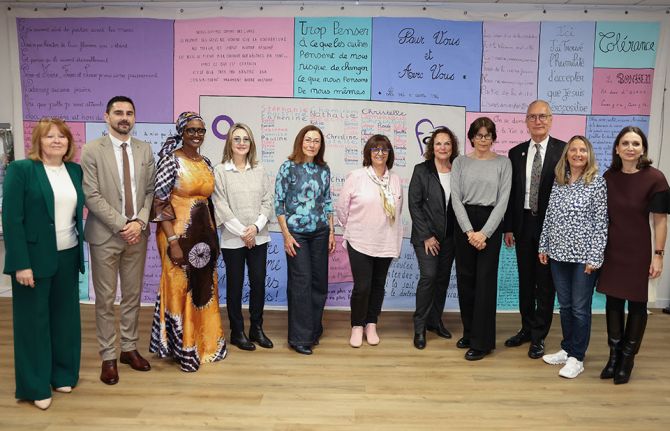
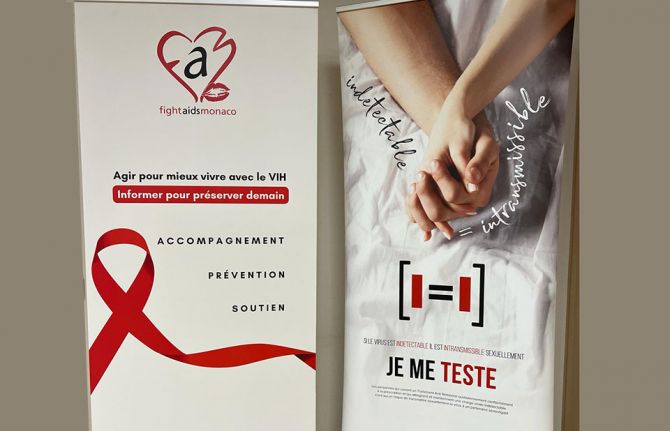
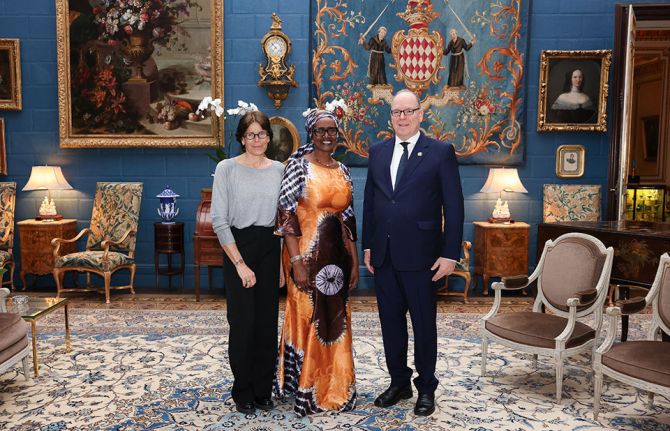
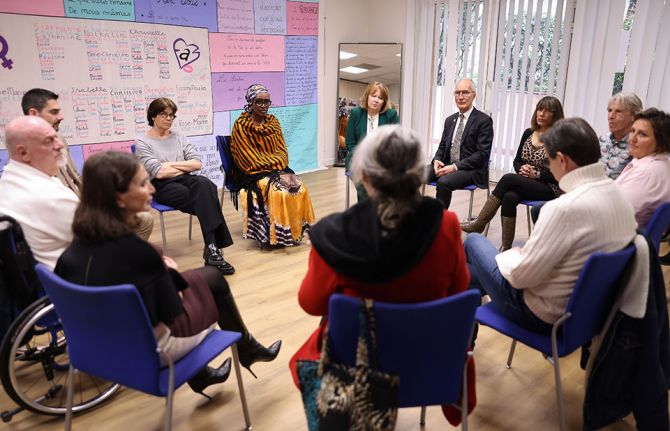
Press Statement
Monaco Principality renews its collaboration with UNAIDS
11 April 2024 11 April 2024GENEVA/MONACO, 11 April 2024— Winnie Byanyima, the Executive Director of UNAIDS—the organization leading the global fight against AIDS—met with HSH Prince Albert II of Monaco and HSH Princess Stéphanie of Monaco and government officials to strengthen Monaco’s collaboration with UNAIDS.
“Monaco is a long-standing and valued partner of UNAIDS. We continue to work together on our broad programme and also in key countries,” said Ms Byanyima. “What we particularly value is how Monaco shows such innovation in fighting HIV, and we learn from each other.”
During a visit to the Fight AIDS Monaco Association, Ms Byanyima and HSH Princess Stéphanie and Ms Byanyima met with volunteers, staff and members of the Association. Fight AIDS Monaco, founded in 2004 by Princess Stéphanie, supports people living with and affected by HIV in Monaco and the neighbouring area. They also fund projects in Madagascar, Burundi, South Africa, Mauritius, and more exceptionally Ukraine, Lebanon and Morocco.
“My heartfelt congratulations to the Fight AIDS Monaco team, celebrating your 20th year – an important milestone- and one that shows your sustained commitment to ending AIDS,” said Ms Byanyima. “It is organizations like yours that make a difference for people’s overall well-being: a safe space to share, kindness and compassion when it is most needed.”
As they gathered around an AIDS memorial quilt, Princess Stéphanie said, “We are a small country, but we can achieve great things.” She then added, “Our foundation is a place where everyone is treated with dignity and without judgement. Fight AIDS Monaco is about giving life.”
Ms Byanyima also thanked Princess Stéphanie for her unwavering engagement as a UNAIDS Goodwill Ambassador and expressed her appreciation for the Princess’s work to address HIV-related stigma and discrimination.
Despite huge progress in the HIV response, globally AIDS still claimed a life every minute in 2022. Monaco’s Minister of Social Affairs and Health, Christophe Robino, stressed that his government’s low cases of new HIV infections was a victory but one not to be taken for granted.
“This is a cause that we need to tackle daily and one day we will be able to end AIDS but we must keep talking about it while it still exists,” Mr Robino said.
Since 1988, Monaco has been implementing an integrated policy on ending HIV as a public health threat. The policy has resulted in free, anonymous HIV screening centres as well as prevention and testing campaigns in schools and businesses.
Earlier during her visit, Ms Byanyima had a working meeting with representatives from the Monegasque government and Fight AIDS Monaco.
Isabelle Berro Amedei, Minister of External Relations and Cooperation said, “Health is one of Monaco’s priorities and that includes the fight against HIV in partner countries. We lead cooperation efforts to support countries where HIV prevalence is high like South Africa, Madagascar and Mozambique.”
Monaco signed a framework agreement with UNAIDS in 2007 and has provided support for UNAIDS work in Haiti (2010-2013), Burundi (2014-2016) and South Africa since 2017. The government of Monaco, Fight AIDS Monaco and UNAIDS vowed to continue their close collaboration on ending AIDS and reiterated their commitment to the Global AIDS Strategy 2021-2026 focusing on ending inequalities to end AIDS.
UNAIDS
The Joint United Nations Programme on HIV/AIDS (UNAIDS) leads and inspires the world to achieve its shared vision of zero new HIV infections, zero discrimination and zero AIDS-related deaths. UNAIDS unites the efforts of 11 UN organizations—UNHCR, UNICEF, WFP, UNDP, UNFPA, UNODC, UN Women, ILO, UNESCO, WHO and the World Bank—and works closely with global and national partners towards ending the AIDS epidemic by 2030 as part of the Sustainable Development Goals. Learn more at unaids.org and connect with us on Facebook, Twitter, Instagram and YouTube.
FIGHT AIDS MONACO
Founded in 2004 by Princess Stéphanie of Monaco, Fight AIDS Monaco is a non-profit organization that helps people living with HIV. It also raises awareness about HIV prevention in schools and supports access to treatment and services in countries like Madagascar, Burundi, Mauritius and Ukraine.
Contact
UNAIDS GenevaCharlotte Sector
tel. +41 79 500 8617
sectorc@unaids.org
Fight AIDS Monaco
Elodie Perisi
tel. +377 97 70 67 97
com@fightaidsmonaco.com

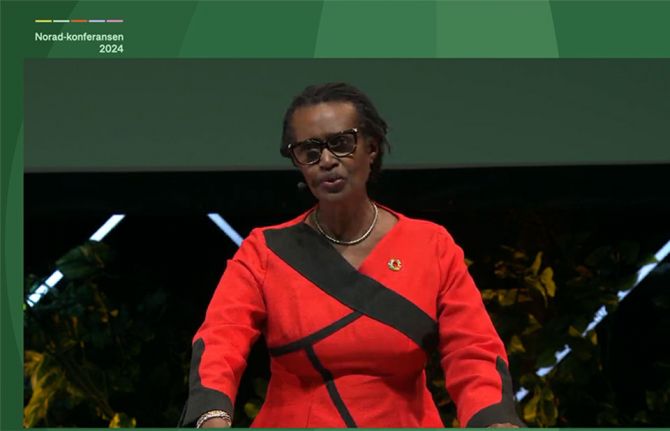
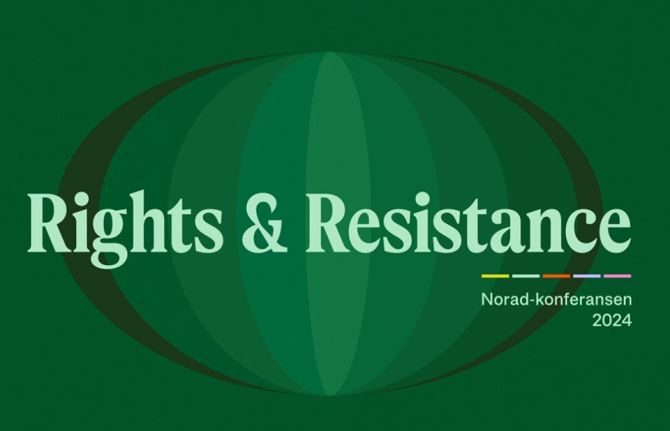
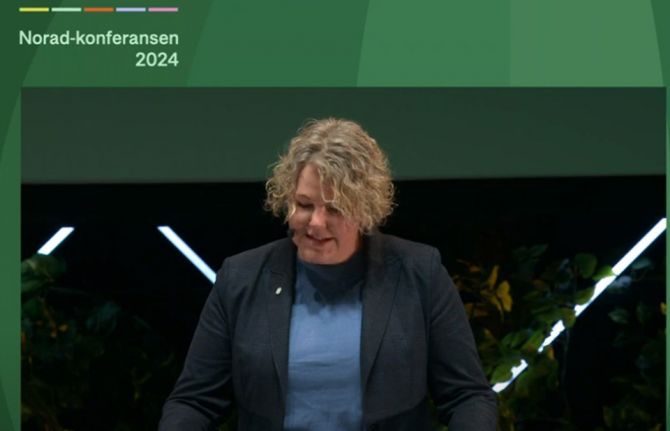
Press Release
UNAIDS Executive Director: let women and girls lead to protect and advance human rights globally
01 February 2024 01 February 2024OSLO/GENEVA, 1 February 2024—At a conference hosted in Oslo by the Norwegian Agency for Development Cooperation (Norad), UNAIDS Executive Director, Winnie Byanyima, has made an impassioned call to all international partners to support women and girls from marginalized communities at the frontlines of the defence of human rights. Only by ensuring that the rights of everyone are protected can the world ensure that the health of everyone is protected, and that the Sustainable Development Goals are achieved.
In her keynote speech at the Rights and Resistance conference Ms Byanyima said, “We cannot separate sustainable development from human rights. We must put human rights at the centre of our development efforts. The AIDS movement, of which I am proud to be part, has been resolute in this. We have demonstrated how patriarchal, racist, and homophobic laws, policies, practices and norms undermine health and hurt everyone.”
She said that progress was in peril from a backlash on human rights but that hard-won gains could be protected and expanded by doing three things:
- Deepening our understanding of the pushback on human rights and democracy
- Bringing our efforts together and connecting the dots to link the struggles, thinking long term and being bold
- Backing and resourcing the people most impacted by the attacks on rights—foremost by supporting women and girls from the poorest and most marginalized communities
In her speech, Ms Byanyima underlined some of the gains made by human rights defenders in recent years through the leadership of women and girls and LGBTQ communities.
- 50 million more girls are in school than were in 2015
- Whereas a few decades ago, two-thirds of countries criminalised same-sex relationships, today two-thirds of countries do not criminalise them.
Opening the conference, Norway’s International Development Minister, Anne Beathe Tvinnereim, said, “We have an obligation to back those who risk their lives fighting for values that we take for granted. Norway will continue aiding those actors on the ground who stress the universality of human rights. We will support free and independent media, including at the local level. Finally, all Norwegian development aid shall be rights-based."
Human rights violations continue to drive the HIV epidemic among women and girls. Every week, 4000 adolescent girls and young women aged 15—24 became infected with HIV globally in 2022. 3100 of these infections occurred in sub-Saharah Africa.
Upholding the rights of marginalized communities is vital for enabling success in the HIV response. When marginalized communities are criminalized or stigmatized, their vulnerability to HIV infection increases, and their access to HIV prevention, treatment, care, and support services is obstructed. UNAIDS research shows that the decriminalization of same-sex relationships is a crucial step in ending the AIDS pandemic.
UNAIDS is highlighting that the recent, well-coordinated and well-funded global pushback against women’s rights, against the human rights of LGBTQ people, against sexual and reproductive health and rights, against democracy and against civic space is not only a threat to everyone’s freedom, it is a threat to everyone’s health. In response to this threat, the AIDS movement and its allies are pushing back against the pushback, reminding world leaders of their commitments to uphold all human rights for all people.
UNAIDS is supporting frontline human rights defenders in both crisis response and in the longer-term work and is helping to expand support for human rights by demonstrating that laws, policies and practices which uphold human rights help countries to ensure public health and to get on track to end AIDS.
The UNAIDS Executive Director expressed confidence that the advancement of rights can be won. “Progress is not automatic. But if we are courageous and united, progress is possible,” said Ms Byanyima.
The full version of Ms. Byanyima’s speech (delivered at 12:50 CET February 1) can be viewed here.
UNAIDS
The Joint United Nations Programme on HIV/AIDS (UNAIDS) leads and inspires the world to achieve its shared vision of zero new HIV infections, zero discrimination and zero AIDS-related deaths. UNAIDS unites the efforts of 11 UN organizations—UNHCR, UNICEF, WFP, UNDP, UNFPA, UNODC, UN Women, ILO, UNESCO, WHO and the World Bank—and works closely with global and national partners towards ending the AIDS epidemic by 2030 as part of the Sustainable Development Goals. Learn more at unaids.org and connect with us on Facebook, Twitter, Instagram and YouTube.

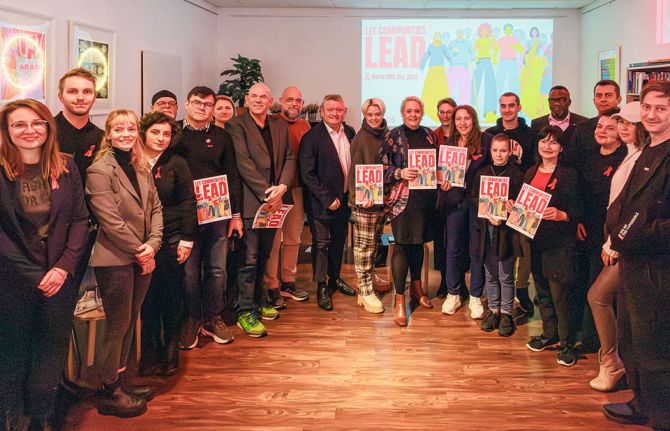
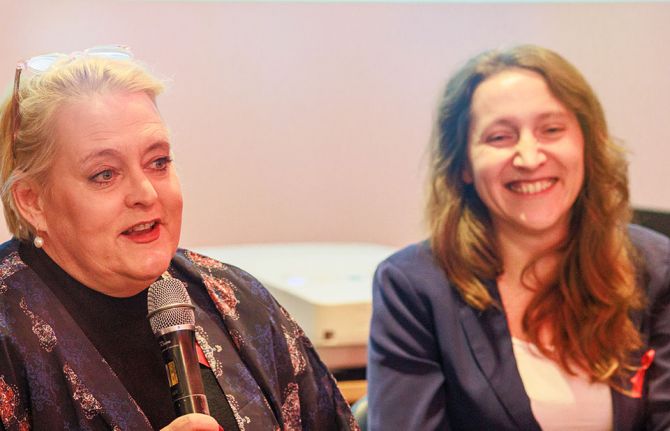
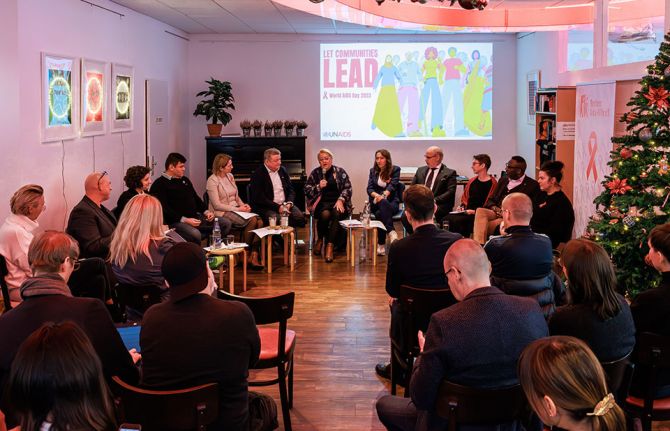
Feature Story
UNAIDS commemorates World AIDS Day in Berlin alongside communities delivering life-saving HIV services in Germany and Ukraine
30 November 2023
30 November 2023 30 November 2023Since the beginning of the war in Ukraine, communities of people living with and affected by HIV have been at the forefront of ensuring the continuity of life-saving HIV services, both for those who remained in Ukraine and for those arriving in Germany as refugees.
At a special World AIDS Day event in Berlin co-hosted by UNAIDS and 100% Life Ukraine, community representatives and civil society activists thanked the German government and UNAIDS for their support and spoke about the continued challenges they face.
“Our journey exemplifies how the strength of perceived minorities and real community leadership can drive life-saving programmes and innovations that can impact the lives of millions of people,” said Valeriia Rachinska, Director of Human Rights, Gender and Communities at 100% LIFE Ukraine. “None of this would be possible without the support of international partners and donors. Global solidarity and support from our partners are the chance for a fair and thriving tomorrow for all, especially those living with HIV.”
100% LIFE is the largest patient-led organization in Ukraine which has as its mission to fight for life. The Network works with patients and for patients, including the representation of the interests of people living with HIV in 25 regions of Ukraine.
Since the beginning of the war in Ukraine, Germany has donated €1,050,000 in emergency funding to UNAIDS, empowering the provision of critical support to people living with and affected by HIV in Ukraine, Poland and Moldova. This includes providing temporary accommodation, humanitarian assistance, social protection, primary health care and testing for HIV, hepatitis C, STIs and tuberculosis. The emergency fund also covered the enrollment of people in HIV prevention and treatment programmes, offering comprehensive care and support.
Among the speakers at the World AIDS Day event was Silke Klumb, CEO of the German AIDS Federation, who underlined the importance of the partnership between government and civil society in ensuring continued access to HIV prevention, treatment and care services for people affected by the war in Ukraine.
"Community-led responses have been and continue to be critical in the HIV response, both in Germany and globally. Thanks to public funding Deutsche Aidshilfe has been able to engage in community-led prevention, counselling, testing, care, and support for 40 years now. Upon this foundation and through the broad network in Ukraine, Eastern Europe and Central Asia, Germany’s community-led organizations under the umbrella of Deutsche Aidshilfe were able to act immediately to Russia’s full-scale invasion of Ukraine,” said Ms Klumb. ”Over the last 18 months, we provided support, information, translations to people fleeing the war and linked them to care. Platforms such as self-help conferences and other meetings helped to strengthen the communities of people living with and affected by HIV. Deutsche Aidshilfe is committed to continue putting the communities at the centre of our work.”
During the event, UNAIDS Deputy Executive Director of Policy, Advocacy and Knowledge, Christine Stegling, presented the new UNAIDS World AIDS Day report Let Communities Lead. The report shows how communities have been the driving force for progress in the global fight against HIV. It shows that investing in community-led HIV programmes can have transformational benefits.
“Since the earliest days of the AIDS pandemic, community leadership has driven life-saving access to HIV treatment and prevention. Continued progress against HIV/AIDS in Ukraine - despite the war and its resulting refugee crisis - is the direct result of Ukrainian and German community leadership. A community-led response is well-positioned to maintain continuity of HIV prevention and treatment services, especially in times of crisis,” said Ms Stegling. “Continuity of HIV care is essential for achieving our ultimate goal of ending AIDS as a public health threat by 2030. UNAIDS thanks all community leaders who stepped up in these challenging times and we thank nations like Germany who understand the value of investing in a community-led response to HIV/AIDS - especially in times of war and other crises.”
The event was moderated by Peter Wiessner of Action against AIDS Germany.
Region/country
Related
 U=U can help end HIV stigma and discrimination. Here’s how
U=U can help end HIV stigma and discrimination. Here’s how

27 February 2025
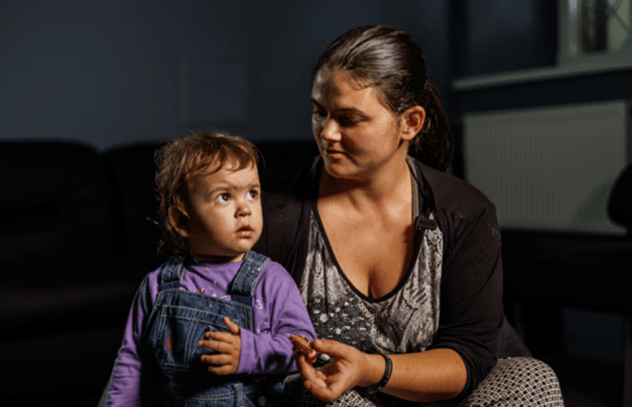 Three Years On: From crisis to prospective recovery
Three Years On: From crisis to prospective recovery

20 February 2025

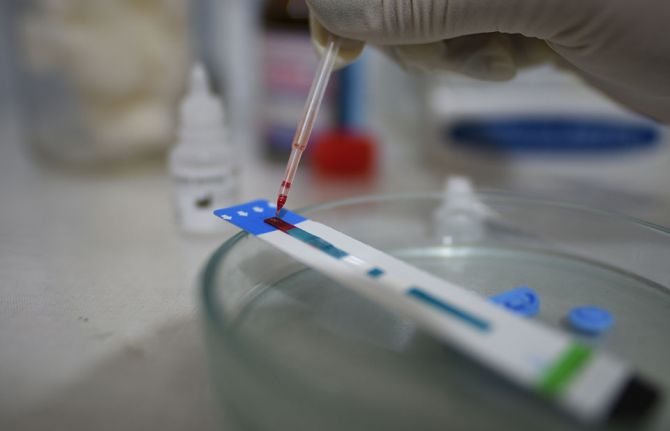
Press Statement
UNAIDS welcomes new research on ‘opt-out’ HIV testing in England
29 November 2023 29 November 2023HIV opt-out testing will consolidate the gains towards HIV epidemic control in the UK
LONDON/GENEVA, 29 November 2023—Ahead of World AIDS Day (1 December) UNAIDS welcomes a new research project to potentially expand ‘opt-out’ HIV testing programmes across England. According to NHS figures, a pilot ‘opt-out’ HIV testing scheme, pioneered by the Elton John Foundation in England has identified more than 3,500 cases of three bloodborne infections since April 2022—HIV, Hepatitis B and Hepatitis C—including identifying more than 580 HIV cases of HIV.
Under pilot scheme in England, anyone having a blood test in selected hospital accident and emergency units has also been offered a test for HIV, Hepatitis B and Hepatitis C, and has been given the option to opt out should they not wish to have the test. The trials have been taking place in 33 hospitals in London, Greater Manchester, Sussex and Blackpool.
"HIV opt-out testing will consolidate the gains towards HIV epidemic control in the UK," said Winnie Byanyima, Executive Director of UNAIDS. "Normalization of HIV testing will not only enable timely access to HIV treatment, allowing people with HIV to live healthy lives—it will also stop new HIV infections and reduce the stigma around getting an HIV test. It will save and change lives and help ensure that no one is left behind."
People living with HIV who are on effective HIV treatment cannot transmit the virus. In the UNAIDS Global AIDS Strategy, UNAIDS has set “95-95-95” targets. Aiming for 95% of people who are living with HIV to know their HIV status, 95% of people who know that they are living with HIV to be on lifesaving antiretroviral treatment, and 95% of people who are on treatment to be virally suppressed.
At least five countries, Botswana, Eswatini, Rwanda, the United Republic of Tanzania, and Zimbabwe have already achieved the “95-95-95” targets. A further 16 other countries, eight of them in sub-Saharan Africa, the region which accounts for 65% of all people living with HIV, are also close to doing so.
On 28 November, UNAIDS released its World AIDS Day report in London, UK urging governments to Let Communities Lead across the world to in ending AIDS. The report shows that AIDS can be ended as a public health threat by 2030, but only if communities on the frontlines get the full support they need from governments and donors. The Elton John Foundation is one of the many organizations supporting community action.
UNAIDS
The Joint United Nations Programme on HIV/AIDS (UNAIDS) leads and inspires the world to achieve its shared vision of zero new HIV infections, zero discrimination and zero AIDS-related deaths. UNAIDS unites the efforts of 11 UN organizations—UNHCR, UNICEF, WFP, UNDP, UNFPA, UNODC, UN Women, ILO, UNESCO, WHO and the World Bank—and works closely with global and national partners towards ending the AIDS epidemic by 2030 as part of the Sustainable Development Goals. Learn more at unaids.org and connect with us on Facebook, Twitter, Instagram and YouTube.
Region/country

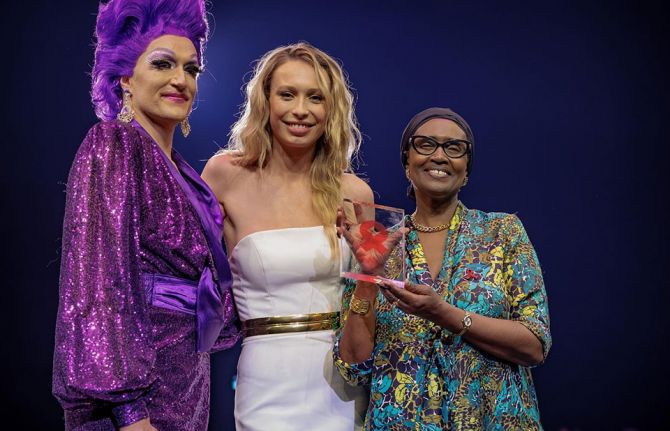

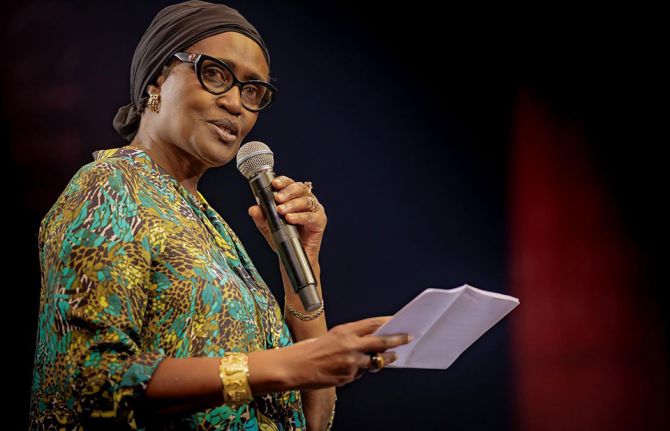
Press Release
Executive Director of UNAIDS receives prestigious award for activism
13 June 2023 13 June 2023GENEVA, 13 June 2023—The Executive Director of UNAIDS Winnie Byanyima has been presented with the prestigious Amsterdam Dinner Award 2023 for her activism and work to end stigma and discrimination around HIV. The annual Amsterdam Dinner, initiated in 1992, is the Netherlands largest fundraising event for HIV and has raised millions of euros to support HIV projects around the world.
Delivering remarks on behalf of Liesje Schreinemacher, Minister for Foreign Trade and Development Cooperation, Loiza Lamers said, “The situation in Uganda makes clear once again that the struggle for equal rights is far from over and proof that the world needs more people like her and more than ever. I am proud that the Netherlands is her ally in this fight. Being who you are and loving who you love should never be a crime.”
“We are grateful that the Netherlands stands strong on LGBTIQ rights and the rights of women and girls and that you are our steadfast ally in this fight,” said Ms Byanyima.
This year’s event shone a spotlight on work for women by women and highlighted the disproportionate impact HIV is having on women and girls. Around the world a young woman aged between 15 and 24 becomes infected with HIV every two minutes and in sub-Saharan Africa young women and girls are 3 times more likely to become infected with HIV than their male peers.
Ms Byanyima is a fierce advocate for the rights of women and girls as well as for the rights of key populations most affected by HIV. “I share this honour with thousands of passionate, fearless activists around the world who daily fight stigma and discrimination and defend the right to health of every human being. I share it with my UNAIDS colleagues,” said Ms Byanyima.
The event held on 10 June in Amsterdam raised 1.3 million euros for projects for women living with HIV in Mozambique and the Netherlands.
UNAIDS
The Joint United Nations Programme on HIV/AIDS (UNAIDS) leads and inspires the world to achieve its shared vision of zero new HIV infections, zero discrimination and zero AIDS-related deaths. UNAIDS unites the efforts of 11 UN organizations—UNHCR, UNICEF, WFP, UNDP, UNFPA, UNODC, UN Women, ILO, UNESCO, WHO and the World Bank—and works closely with global and national partners towards ending the AIDS epidemic by 2030 as part of the Sustainable Development Goals. Learn more at unaids.org and connect with us on Facebook, Twitter, Instagram and YouTube.
Region/country

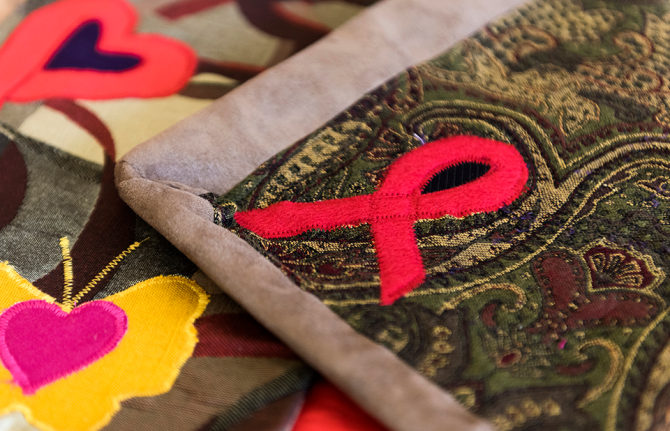
Press Release
UNAIDS welcomes the announcement that Spain will be making a new € 1 million contribution to UNAIDS
06 January 2023 06 January 2023GENEVA, 6 January 2023—Spain’s Ministry of Health has officially announced € 1 million to support UNAIDS’ work on ending AIDS by 2030 as part of the Sustainable Development Goals.
“We warmly welcome Spain’s renewed political, technical and financial leadership at this critical time,” said Winnie Byanyima, Executive Director of UNAIDS. “We look forward to continuing the partnership with Spain to end AIDS both within the country and around the world and tackle the inequalities that continue to drive the pandemic. We strongly commend Spain for its actions and encourage more partners to become funders to the Joint Programme.”
In May 2022, the Ms Byanyima visited Spain to meet with the Minister of Health Carolina Darias who praised UNAIDS on its leadership and coordinating role in the global fight to end AIDS. She stressed that the response to HIV remains a top priority and that Spain would look at ways in which it could increase support to global efforts.
In recent weeks, a series of donors, including the UK, Australia and the Netherlands have announced funding commitments and multi-year agreements to UNAIDS to fill the funding gap which was discussed at UNAIDS Programme Coordinating Board meeting held in Chiang Mai, Thailand in December 2022.
“Spain is walking the talk by taking an important step to become a donor again and help UNAIDS to deliver on the Global AIDS Strategy 2021-2026, we congratulate Spain on its efforts and renewed commitment to UNAIDS,” said Ms Byanyima.
UNAIDS has led the global AIDS response since 1996, positioning, defining and scaling up the response to HIV by providing the quality data on the HIV pandemic, calling for action, fostering dialogue and ensuring that communities most affected by HIV have a seat at the decision-making table.
Minister Darias expressed the Spanish Government's commitment, together with UNAIDS, to end AIDS as a public health threat by 2030, as well eliminating stigma and discrimination against people living with and affected by HIV. She also reaffirmed that ending AIDS will be a priority issue during the next Spanish Presidency of the Council of the European Union in the second half of 2023.
UNAIDS looks forward to continuing to build the partnership with Spain to remove all forms of discrimination and ensure an effective response to HIV, based on evidence and grounded in human rights.
UNAIDS
The Joint United Nations Programme on HIV/AIDS (UNAIDS) leads and inspires the world to achieve its shared vision of zero new HIV infections, zero discrimination and zero AIDS-related deaths. UNAIDS unites the efforts of 11 UN organizations—UNHCR, UNICEF, WFP, UNDP, UNFPA, UNODC, UN Women, ILO, UNESCO, WHO and the World Bank—and works closely with global and national partners towards ending the AIDS epidemic by 2030 as part of the Sustainable Development Goals. Learn more at unaids.org and connect with us on Facebook, Twitter, Instagram and YouTube.
Region/country

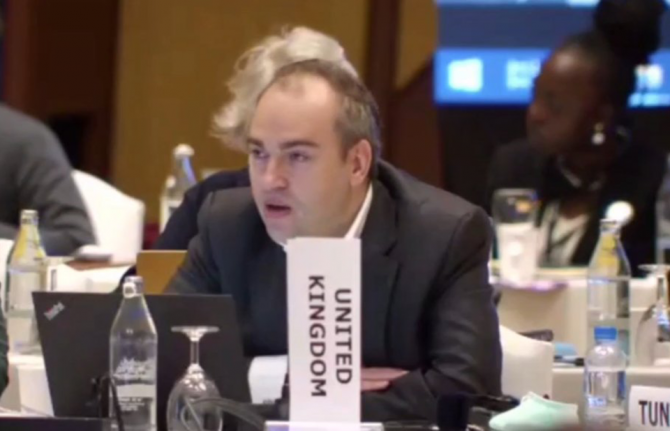
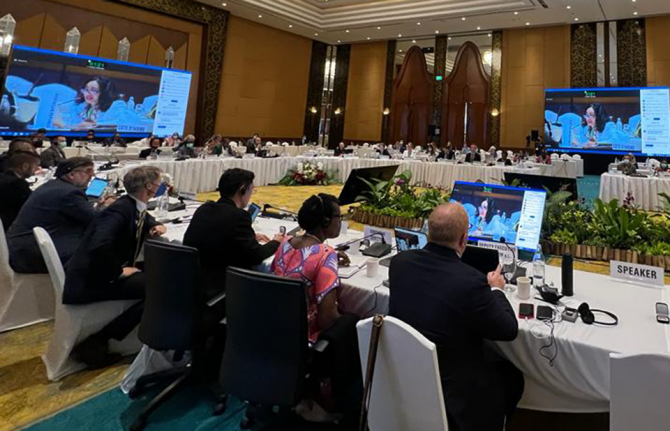
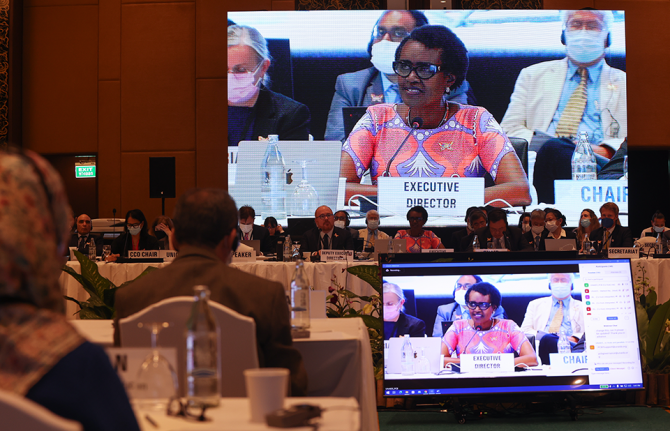
Press Statement
UNAIDS welcomes strong funding commitments from the United Kingdom and from Ireland
13 December 2022 13 December 2022CHAING MAI/GENEVA, 13 December 2022—UNAIDS welcomes confirmation from the United Kingdom that it will be increasing its funding to UNAIDS from £2.5 million in 2021 to £8 million in 2022.
UNAIDS also welcomes plans being finalized for a multi-year funding agreement between UNAIDS and Ireland for the period 2023 to 2026.
In recent weeks, a series of donors have been announcing funding commitments to UNAIDS.
The decisions were shared at the 51st meeting of UNAIDS Programme Coordinating Board being held in Chaing Mai, Thailand, and will help provide to secure predictable and timely funding to UNAIDS to enable UNAIDS to deliver on the Global AIDS Strategy 2021-2026.
“We warmly welcome the United Kingdom’s decision to announce further funding to UNAIDS, and Ireland’s multi-year commitment, which underscore both countries’ bold commitment to end AIDS and tackle the inequalities that continue to drive the pandemic,” said the Executive Director of UNAIDS Winnie Byanyima. “The United Kingdom and Ireland are valued and steadfast partners to UNAIDS, and their support allows us to provide the leadership and coordination that the global HIV response requires at this critical time.”
Both the United Kingdom and Ireland share UNAIDS commitment to an equality based, evidence driven approach to ending AIDS which champions the rights of women, girls and the key populations most vulnerable to HIV infection.
Thank you to the United Kingdom for contributing a further £8 million to UNAIDS.
— UNAIDS (@UNAIDS) December 13, 2022
We are grateful for the UK's partnership and support, and for their commitment to the AIDS response. #PCB51 pic.twitter.com/tnd61NKWoi
We are pleased to be finalizing a multi-year funding agreement with Ireland, as announced at #PCB51.
— UNAIDS (@UNAIDS) December 13, 2022
Thank you Ireland for your support and your longstanding commitment to the AIDS response. Together we can #endAIDS by 2030! pic.twitter.com/pLAwYjR631
UNAIDS
The Joint United Nations Programme on HIV/AIDS (UNAIDS) leads and inspires the world to achieve its shared vision of zero new HIV infections, zero discrimination and zero AIDS-related deaths. UNAIDS unites the efforts of 11 UN organizations—UNHCR, UNICEF, WFP, UNDP, UNFPA, UNODC, UN Women, ILO, UNESCO, WHO and the World Bank—and works closely with global and national partners towards ending the AIDS epidemic by 2030 as part of the Sustainable Development Goals. Learn more at unaids.org and connect with us on Facebook, Twitter, Instagram and YouTube.

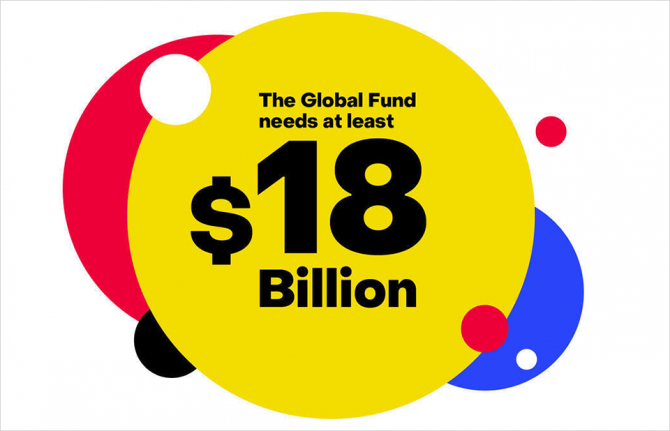
Press Statement
UNAIDS commends Germany’s pledge of €1.3 billion for the 7th Global Fund Replenishment
08 September 2022 08 September 2022GENEVA, 8 September 2022—UNAIDS warmly welcomes Germany’s pledge of €1.3 billion for the 7th replenishment of the Global Fund to Fight AIDS, Tuberculosis and Malaria, an increase of 30% on the country’s contribution of €1 billion made in 2019. The announcement is a significant step towards reaching the goal of raising at least $18 billion when President Biden hosts the 7th Global Fund Replenishment Conference in New York later this month.
“This announcement demonstrates Germany’s continued leadership in global health, its commitment to multilateralism and its determination to save millions of lives by ending AIDS, tuberculosis and malaria by 2030,” said UNAIDS Executive Director, Winnie Byanyima. “This is an investment in young people’s health and wellbeing—particularly of young women and girls —and it will strengthen global security by instilling resilience into systems needed to protect all of us from emerging health threats. I look forward to other donors matching Germany’s increase in funding.”
The United States is the Global Fund’s largest donor and has pledged $6 billion for the organization’s 7th replenishment contingent on the $18 billion target being fully met. Last week, Japan announced that it was increasing its contribution to the Global Fund by 30% to more than $1 billion.
The Global Fund Replenishment Conference takes place from 19—21 September at a time when funding for the HIV response remains under intense pressure. In 2021, international resources available for HIV were 6% lower than in 2010. Overseas development assistance for HIV from bilateral donors other than the United States has fallen by 57% over the last decade. The HIV response in low- and middle-income countries is US$8 billion short of the US$29 billion needed by 2025 to get the world on track to end the AIDS pandemic as a global health threat by 2030.
To maximize the effectiveness of their investments to the Global Fund, donors are also being urged to fully fund the Joint United Nations Programme on HIV/AIDS. UNAIDS is present in 70 countries worldwide working in partnership with governments, civil society and communities, collecting the data that shapes the HIV response, advocating for the reversal of harmful laws and policies to create an enabling legal environment, working for an end to HIV-related stigma and discrimination, and challenging the inequalities driving the HIV pandemic among vulnerable and marginalized groups of people.
UNAIDS latest report In Danger, shows that recent crises have knocked the global AIDS response off track, with HIV infections on the rise in 38 countries. It shows also that the end of AIDS by 2030 is possible, if leaders act boldly together.
The announcement of Germany’s increase was made in Berlin by the Federal Minister for Economic Cooperation and Development, Svenja Schulze, at the Get Back On Track international conference organized by civil society organizations, including Action Against AIDS Germany.
UNAIDS
The Joint United Nations Programme on HIV/AIDS (UNAIDS) leads and inspires the world to achieve its shared vision of zero new HIV infections, zero discrimination and zero AIDS-related deaths. UNAIDS unites the efforts of 11 UN organizations—UNHCR, UNICEF, WFP, UNDP, UNFPA, UNODC, UN Women, ILO, UNESCO, WHO and the World Bank—and works closely with global and national partners towards ending the AIDS epidemic by 2030 as part of the Sustainable Development Goals. Learn more at unaids.org and connect with us on Facebook, Twitter, Instagram and YouTube.

